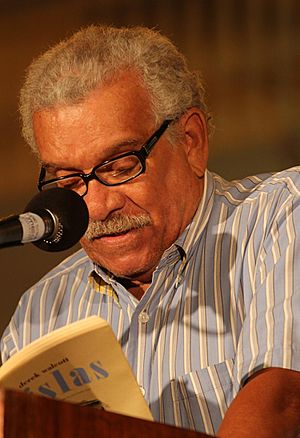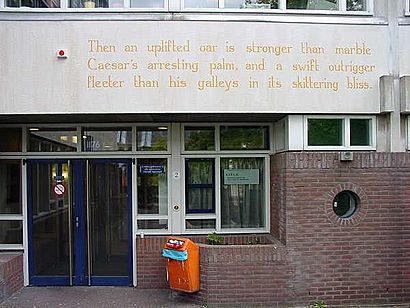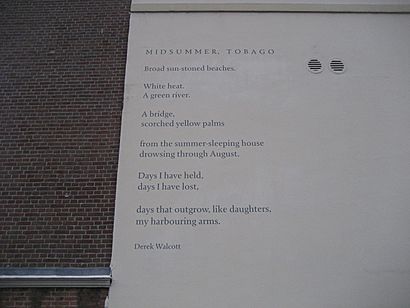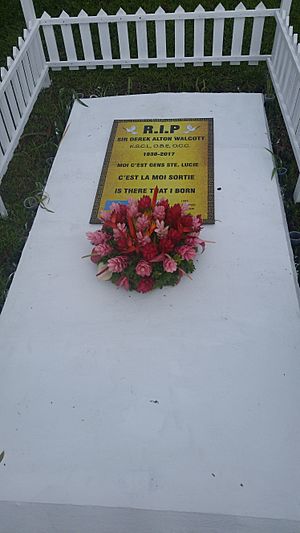Derek Walcott facts for kids
Quick facts for kids
Derek Walcott
KCSL OBE OCC
|
|
|---|---|
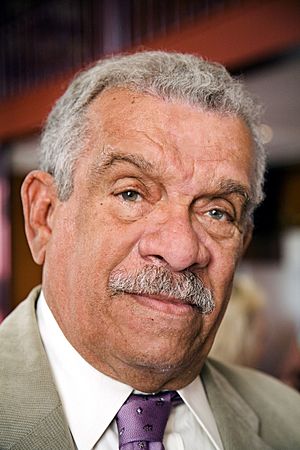
Walcott at an honorary dinner in Amsterdam, 20 May 2008
|
|
| Born | Derek Alton Walcott 23 January 1930 Castries, Saint Lucia |
| Died | 17 March 2017 (aged 87) Cap Estate, Gros-Islet, Saint Lucia |
| Occupation | Poet, playwright, professor |
| Nationality | Saint Lucian |
| Genre | Poetry and plays |
| Literary movement | Postcolonialism |
| Notable works | Dream on Monkey Mountain (1967), Omeros (1990), White Egrets (2007) |
| Notable awards | Nobel Prize in Literature 1992 T. S. Eliot Prize 2010 |
| Children | 3 |
| Signature | |
Sir Derek Alton Walcott (born January 23, 1930 – died March 17, 2017) was a famous poet and playwright from Saint Lucia. He won the 1992 Nobel Prize in Literature, which is one of the highest honors for writers.
One of his most well-known works is the long poem Omeros (1990). Many people consider it his greatest achievement. Besides the Nobel Prize, Walcott received many other awards. These include an Obie Award for his play Dream on Monkey Mountain and the T. S. Eliot Prize for his poetry book White Egrets. He was also honored with the Queen's Gold Medal for Poetry.
Contents
Early Life and Childhood
Derek Walcott grew up in Castries, Saint Lucia, which is an island in the West Indies. His mother, Alix, was a teacher who loved poetry. His father, Warwick, was a talented painter who worked for the government. Sadly, his father passed away when Derek and his twin brother, Roderick, were only one year old. Their mother raised them.
The Walcott family had a mix of English, Dutch, and African backgrounds. This mix reflected the interesting history of Saint Lucia, which was once a colony. Derek explored these different cultures in his poems. His family was part of a small Methodist community on the island, which was different from the main Catholic culture.
As a young man, Walcott also trained as a painter. He looked up to artists like Paul Cézanne and Giorgione. Later, some of his paintings were shown in an art exhibition in New York City.
Walcott felt a strong calling to be a writer from a young age. He loved the English language and was inspired by famous poets like T. S. Eliot. In one of his poems, he wrote about feeling chosen to be a poet since childhood.
When he was just 14, Walcott published his first poem in a local newspaper. By age 19, he had already self-published two collections of poems. His mother helped him pay for the printing. He sold the books to his friends to cover the costs. After finishing high school, he earned a scholarship to study at the University College of the West Indies in Kingston, Jamaica.
Career and Major Works
After college, Walcott moved to Trinidad in 1953. There, he worked as a critic, teacher, and journalist. He also started the Trinidad Theatre Workshop in 1959, where he was very active.
His collection of poems, In a Green Night: Poems 1948–1960 (1962), became known around the world. It explored the Caribbean's history, especially how it was affected by colonialism. His play Dream on Monkey Mountain (1970) was shown on TV in the United States. This play tells the story of Makak, whose struggles represent the challenges faced by people living under colonial rule. In 1971, the play won an Obie Award for "Best Foreign Play." The next year, Walcott received an OBE from the British government for his literary work.
Walcott later taught at Boston University in the United States. In 1981, he started the Boston Playwrights' Theatre. He taught literature and writing there for over 20 years. He also became friends with other famous poets, like Joseph Brodsky and Seamus Heaney.
His long poem Omeros (1990) is considered his most important work. It is inspired by the ancient Greek epic poem The Iliad. Omeros was highly praised by newspapers like The Washington Post and The New York Times Book Review.
In 1992, Derek Walcott received the Nobel Prize in Literature. The Nobel committee praised his poetry for its "great brightness" and its understanding of history and different cultures. He also won a Lifetime Achievement award in 2004.
Later, he published more poetry collections, including Tiepolo's Hound (2000) and White Egrets (2010). White Egrets won the T.S. Eliot Prize. In 2016, he was honored as one of the first knights of the Order of Saint Lucia.
Writing Style and Themes
Themes in His Work
Spirituality and his Methodist faith were very important in Walcott's writing. He believed that writing poetry was like a prayer or a special calling. He often felt a sense of deep joy and gratitude when he wrote. He also said that when a poem was coming to him, he would go into a quiet space, almost forgetting himself, to let the words flow.
Influences on His Writing
Walcott shared that American poets Robert Lowell and Elizabeth Bishop, who were also his friends, influenced his writing.
Plays and Essays
Walcott wrote more than 20 plays. Many of them were performed by the Trinidad Theatre Workshop. His plays often explored the unique situation of the West Indies after colonial rule. He looked at the challenges and changes in identity that came with this period.
In his essay "What the Twilight Says" (1970), Walcott thought about what it was like to be an artist in the West Indies. He noted that the region had few original local art forms and a developing national identity. He wrote, "We are all strangers here... Our bodies think in one language and move in another." This shows how colonialism affected people's understanding of themselves.
Walcott felt that growing up in the West Indies, without a long-established literary tradition, was also a special opportunity. He said his generation of writers felt excited to write about their places and people for the first time. They also knew they could learn from great writers like Daniel Defoe and Charles Dickens.
He saw himself as a "Caribbean writer" who helped make sense of the lasting effects of colonialism. In his poems like "The Castaway" and plays like Pantomime, he used ideas of shipwrecks and characters like Robinson Crusoe. These images helped him describe the culture and what artists needed to do after slavery and colonialism: to be free to start fresh, use the best parts of other cultures, and create something new. He believed it was important to move forward and not dwell on the past.
Omeros
Walcott's epic poem Omeros was published in 1990 and received great praise. The poem is loosely inspired by the ancient Greek poet Homer and his famous work, The Iliad. Some of the main characters in Omeros are fishermen named Achille and Hector, a retired English officer Major Plunkett, his wife Maud, a housemaid named Helen, and a blind man named Seven Seas, who represents Homer.
Even though most of the story takes place on Walcott's home island of St. Lucia, the poem also includes scenes from other places. For example, Achille imagines a journey on a slave ship from Africa to the Americas. Walcott also describes his own travels to cities like Lisbon, London, and Dublin in the poem.
Omeros explores many of the themes Walcott often wrote about: the beauty of the islands, the impact of colonialism, the mixed identity of Caribbean people, and the role of a poet in a world that has moved past colonial rule. In this epic poem, Walcott celebrates the unique cultures and traditions of the Caribbean.
Praise for His Work
Many famous poets praised Walcott's writing. Robert Graves said Walcott understood English better than most of his peers. Joseph Brodsky said Walcott's poems were like "tidal waves" that made the map of modern literature richer. Brodsky, Walcott, and Seamus Heaney were all poets who taught in the United States and felt they were "outside the American experience."
While most reviews of Walcott's work are positive, some critics had mixed feelings. However, many, like Adam Kirsch from The New Yorker, highly praised his unique style. Kirsch described Walcott's writing as combining what he saw with creative comparisons, creating a beautiful and thoughtful style. He said Walcott's poems suggest that people see the world with both their senses and their minds, which mix together to create a "magical" way of thinking.
A documentary film called Poetry is an Island was released in 2013. It tells the story of Walcott's life and how his birthplace of St Lucia always influenced him.
Personal Life
Derek Walcott was married three times and had three children. His son, Peter Walcott, is a painter in St. Lucia. His daughters are Elizabeth Walcott-Hackshaw and Anna Walcott-Hardy. Until his death, his companion was Sigrid Nama.
Walcott loved to travel all over the world. He divided his time between New York, Boston, and St. Lucia. He often included the influences of these different places in his writing.
Death
Derek Walcott passed away at his home in St. Lucia on March 17, 2017, at the age of 87. He received a state funeral, which is a special public ceremony, on March 25. He was buried at Morne Fortune.
Legacy
In 1993, a public park in central Castries, Saint Lucia, was named Derek Walcott Square in his honor. The documentary film Poetry Is an Island: Derek Walcott (2013) also celebrates his life and contributions.
In 2015, Walcott's childhood home in Castries was bought by the Saint Lucia National Trust. It was renovated and opened to the public as Walcott House in January 2016. In 2020, his books on Caribbean Literature and poetry were donated to the library at the Sir Arthur Lewis Community College in St. Lucia.
Awards and Honours
- 1971: Obie Award for Best Foreign Play (for Dream on Monkey Mountain)
- 1972: Officer of the Order of the British Empire
- 1981: MacArthur Foundation Fellowship ("genius award")
- 1988: Queen's Gold Medal for Poetry
- 1992: Nobel Prize in Literature
- 2004: Anisfield-Wolf Book Award for Lifetime Achievement
- 2011: T. S. Eliot Prize (for poetry collection White Egrets)
- 2011: OCM Bocas Prize for Caribbean Literature (for White Egrets)
- 2015: Griffin Trust For Excellence in Poetry Lifetime Recognition Award
- 2016: Knight Commander of the Order of Saint Lucia
List of Works
Poetry Collections
- 1948: 25 Poems
- 1949: Epitaph for the Young: Xll Cantos
- 1962: In a Green Night: Poems 1948—60
- 1965: The Castaway and Other Poems
- 1969: The Gulf and Other Poems
- 1973: Another Life
- 1976: Sea Grapes
- 1979: The Star-Apple Kingdom
- 1981: The Fortunate Traveller
- 1984: Midsummer
- 1986 Collected Poems, 1948–1984
- 1990: Omeros
- 1997: The Bounty
- 2000: Tiepolo's Hound (includes his watercolors)
- 2004: The Prodigal
- 2010: White Egrets
- 2016: Morning, Paramin
Plays
- 1950: Henri Christophe: A Chronicle in Seven Scenes
- 1954: The Sea at Dauphin: A Play in One Act
- 1958: Ti-Jean and His Brothers
- 1967: Dream on Monkey Mountain
- 1974: The Joker of Seville
- 1978: Pantomime
- 1984: The Haitian Earth
- 1993: Odyssey: A Stage Version
- 1997: The Capeman (with Paul Simon)
- 2014: O Starry Starry Night
Other Books
- 1993: The Antilles: Fragments of Epic Memory (essays)
- 1998: What the Twilight Says (essays)
Images for kids
See also
 In Spanish: Derek Walcott para niños
In Spanish: Derek Walcott para niños
- List of black Nobel laureates
- Omeros, epic poetry by Derek Walcott
- Caribbean Epic
 | Sharif Bey |
 | Hale Woodruff |
 | Richmond Barthé |
 | Purvis Young |


